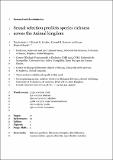Files in this item
Sexual selection predicts species richness across the animal kingdom
Item metadata
| dc.contributor.author | Janicke, Tim | |
| dc.contributor.author | Ritchie, Michael G. | |
| dc.contributor.author | Morrow, Edward H. | |
| dc.contributor.author | Marie-Orleach, Lucas | |
| dc.date.accessioned | 2018-05-11T10:30:06Z | |
| dc.date.available | 2018-05-11T10:30:06Z | |
| dc.date.issued | 2018-05-16 | |
| dc.identifier | 253058955 | |
| dc.identifier | a42d1c93-6a57-47c3-8476-65ace9cbe9bc | |
| dc.identifier | 85046548253 | |
| dc.identifier | 000432371500006 | |
| dc.identifier.citation | Janicke , T , Ritchie , M G , Morrow , E H & Marie-Orleach , L 2018 , ' Sexual selection predicts species richness across the animal kingdom ' , Proceedings of the Royal Society B: Biological Sciences , vol. 285 , no. 1878 , 20180173 . https://doi.org/10.1098/rspb.2018.0173 | en |
| dc.identifier.issn | 0962-8452 | |
| dc.identifier.other | crossref: 10.1098/rspb.2018.0173 | |
| dc.identifier.other | ORCID: /0000-0001-7913-8675/work/46761143 | |
| dc.identifier.uri | https://hdl.handle.net/10023/13330 | |
| dc.description | Funding: Swiss National Science Foundation to T. J. (PA00P3-145375/1) and to L.M.-O. (P2BSP3_158842 and P300PA_171516). | en |
| dc.description.abstract | Our improving knowledge of the animal tree of life consistently demonstrates that some taxa diversify more rapidly than others, but what contributes to this variation remains poorly understood. An influential hypothesis proposes that selection arising from competition for mating partners plays a key role in promoting speciation. However, empirical evidence showing a link between proxies of this sexual selection and species richness is equivocal. Here, we collected standardized metrics of sexual selection for a broad range of animal taxa, and found that taxonomic families characterized by stronger sexual selection on males show relatively higher species richness. Thus, our data support the hypothesis that sexual selection elevates species richness. This could occur either by promoting speciation and/or by protecting species against extinction. | |
| dc.format.extent | 8 | |
| dc.format.extent | 663038 | |
| dc.language.iso | eng | |
| dc.relation.ispartof | Proceedings of the Royal Society B: Biological Sciences | en |
| dc.subject | Bateman gradient | en |
| dc.subject | Bateman principles | en |
| dc.subject | Diversification | en |
| dc.subject | Macroevolution | en |
| dc.subject | Species diversity | en |
| dc.subject | Reproductive isolation | en |
| dc.subject | GE Environmental Sciences | en |
| dc.subject | QH301 Biology | en |
| dc.subject | QH426 Genetics | en |
| dc.subject | DAS | en |
| dc.subject | BDC | en |
| dc.subject | R2C | en |
| dc.subject.lcc | GE | en |
| dc.subject.lcc | QH301 | en |
| dc.subject.lcc | QH426 | en |
| dc.title | Sexual selection predicts species richness across the animal kingdom | en |
| dc.type | Journal article | en |
| dc.contributor.institution | University of St Andrews. School of Biology | en |
| dc.contributor.institution | University of St Andrews. Centre for Biological Diversity | en |
| dc.contributor.institution | University of St Andrews. Institute of Behavioural and Neural Sciences | en |
| dc.identifier.doi | https://doi.org/10.1098/rspb.2018.0173 | |
| dc.description.status | Peer reviewed | en |
This item appears in the following Collection(s)
Items in the St Andrews Research Repository are protected by copyright, with all rights reserved, unless otherwise indicated.

